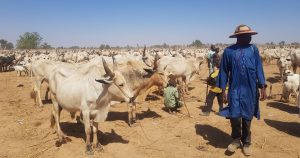NEWS
Current Poor Power Supply in South East is Beyond Organisation – EEDC

From Sylvia Udegbunam, Enugu
The Enugu Electricity Distribution Company (EEDC) has said the poor power supply currently experienced by its customers across the South-East is beyond the organisation.
The company attributed the situation to low energy generation, which has resulted in a drop in power supply availability generally.
The Head, Corporate Communications of EEDC, Mr Emeka Ezeh made this known on Monday to newsmen in Enugu.
Ezeh, however, appealed to residents of the zone to bear with the company.
According to him, the development has resulted in low generation, leading to a reduction in the quantum of daily megawatt hour (MWH) of energy allocated to distribution companies nationwide, thereby impacting the quality of service to its customers.
“We understand the inconveniences this situation has caused our esteemed customers and appeal for their understanding as it is beyond us.
“We can only distribute what is allocated to us,” he said.
Ezeh said that efforts are being made by the various stakeholders in the power sector to address this issue, and “we hope this yields positive results so that normal distribution will return.”
He said that EEDC remained committed to providing improved services to her esteemed customers.
Health
Group urges Nigerians to embrace healthy habits to prevent diseases

The Society of Lifestyle Medicine of Nigeria (SOLONg) has advised Nigerians to embrace healthy preventive lifestyle habits to prevent the root causes of chronic and lifestyle-related diseases.
The President of SOLONg, Dr Moyosore Makinde, gave the advice in an interview in commemoration of the “Global Lifestyle Medicine Week” on Tuesday in Lagos.
NAN reports that the Global Lifestyle Medicine Week, taking place from May 18 to May 24, 2025, has the theme “Celebrating Healthy Habits: Inspire Change with D.
R.E.A.M.S.”Makinde, also an International Board-certified Lifestyle Medicine Physician, said the week was dedicated to raising awareness about the transformative power of lifestyle medicine in improving health outcomes and reducing the burden of chronic diseases worldwide.
According to her, lifestyle medicine empowers people to live healthier, happier and longer lives.
She explained that the D.R.E.A.M.S. acronym highlighted the six key pillars of lifestyle medicine that guide individuals toward healthier lives namely: Predominantly plant-based Diets, positive Relationships or social connections, Exercise, Avoidance of toxic substances, Mental wellness and stress management, and restorative Sleep.
She said that these pillars had been proven by scientific research to not only manage and prevent chronic diseases like coronary heart disease, diabetes, dementia and Alzheimer’s but also to promote a more sustainable and harmonious relationship with ourselves and with our planet.
Makinde added that it contributed to planetary health and the stability of our ecosystem.
“SOLONg is proud to announce its participation in Global Lifestyle Medicine Week, taking place from May 18 to May 24, 2025.
“Scientific studies, including numerous randomised clinical trials and longitudinal studies, have consistently shown the remarkable benefits of lifestyle interventions in reducing the incidence of chronic conditions.
“Additionally, these healthy habits play a pivotal role in strengthening resilience against infectious diseases.
“The ongoing impact of several pandemics has underscored the importance of adopting healthy behaviours, as poor lifestyle choices have been associated with worse disease severity and slower recovery times,” she said.
Contributing, the General Secretary of SOLONg, Dr Chika Anozie, said that Global Lifestyle Medicine Week aimed to foster a community of like-minded individuals and healthcare professionals committed to lifestyle medicine.
Anozie, also a Family Physician, said that SOLONg would organise various activities to mark the week, including a Webinars and educational workshops on lifestyle medicine topics.
She added that there would be courtesy visits and community outreach programmes promoting healthy habits, as well as social media campaigns sharing lifestyle medicine tips and resources.
“As we observe Global Lifestyle Medicine Week, it is clear that the need for Lifestyle Medicine is greater than ever.
“This is a clarion call for the government to create policies that promote healthy lifestyle practices while restricting behaviours that contribute to disease.
“We urge medical institutions to prioritise the accreditation of Lifestyle Medicine programs at both undergraduate and postgraduate levels.
“It is equally important that health professionals receive the proper training to effectively communicate these life-saving messages to the public.
“The Society encourages individuals to embrace the principles of healthy living, which are not only lifechanging but also long-lasting,” she said.(NAN)
Foreign News
Man Executed in Indiana For Killing Police Officer

Benjamin Ritchie, 45, had been on Indiana’s death row since 2002, when he was convicted of killing Beech Grove Police Officer Bill Toney during a chase on foot.
Benjamin Ritchie, 45, had been on Indiana’s death row since 2002, when he was convicted of killing Beech Grove Police Officer Bill Toney during a chase on foot.
Ritchie was executed at the Indiana State Prison in Michigan City, according to Indiana Department of Correction officials.
IDOC said in a statement that the process started shortly after midnight and Ritchie was pronounced dead at 12:46 a.m.
Ritchie’s last meal was from the Olive Garden and he expressed love, support and peace for his friends and family, according to the statement.
Under state law, he was allowed five witnesses at his execution, which included his attorney Steve Schutte, who told reporters he had a limited view of the process.
“I couldn’t see his face. He was lying flat by that time,” Schutte said. “He sat up, twitched, laid back down.”
The process was carried out hours after the U.S. Supreme Court declined to take the case, exhausting all of Ritchie’s legal options to fight the death sentence.
Dozens of people, both anti-death penalty advocates and supporters of Toney, stood outside the prison until early Tuesday.
Indiana resumed executions in December after a year’s long hiatus due to a scarcity of lethal injection drugs nationwide.
Prison officials provided photos of the execution chamber before Joseph Corcoran’s execution, showing a space that looks like an operating room with a gurney, fluorescent lighting and an adjacent viewing room.
They’ve since offered few other details.
Among the 27 states with death penalty laws, Indiana is one of two that bars media witnesses.
The other, Wyoming, has conducted one execution in the last half-century.
The Associated Press and other media organisations filed a federal lawsuit in Indiana seeking media access, but a federal judge denied a preliminary injunction last week that would have allowed journalists to witness Ritchie’s execution and future ones.
The judge found that barring the news media doesn’t violate the First Amendment nor does it single out the news media for unequal treatment.
The execution in Indiana is among 12 scheduled in eight states this year.
Ritchie’s execution and two others in Texas and Tennessee will be carried out this week.
Ritchie was 20 when he and others stole a van in Beech Grove, near Indianapolis.
He then fired at Toney during a foot chase, killing him.
At the time Ritchie was on probation from a 1998 burglary conviction.
Toney, 31, had worked at the Beech Grove Police Department for two years.
The married father of two was the first officer of the small department to be killed by gunfire in the line of duty. (AP/NAN)
Foreign News
WHO Member States Adopt New Pandemic Treaty

Member states of the World Health Organisation (WHO) on Tuesday adopted a new pandemic treaty aimed at avoiding the panic and disarray seen during the COVID-19 crisis.
The agreement was accepted without a formal vote on the second day of the members’ annual World Health Assembly in Geneva.
As the conference chair asked whether there were any objections, silence followed, prompting him to declare the treaty adopted by consensus.
The treaty outlines measures for coordinated procurement of protective equipment during future pandemics, enhanced monitoring of diseases in both animals and humans.
There should also be the transfer of medical technology to ensure that medicines and vaccines can be produced in low-income countries.
However, several contentious details remain unresolved and are set to be negotiated separately over the next year as part of an annex to the treaty.
These include a new mechanism to accelerate vaccine production and ensure equitable distribution to poorer nations. (dpa/NAN)





























